Office Composting 101: How to Start Composting at Work
- By The FruitGuys
- Last Updated On
- Reading Time: 5 mins.
If you’re worried about the food waste piling up in trash cans at your office, composting at work might be the perfect solution. Composting is an incredible process that turns undesirable organic waste into valuable, nutrient-rich fertilizer. It’s also great for the planet—and it’s easier than you might think.
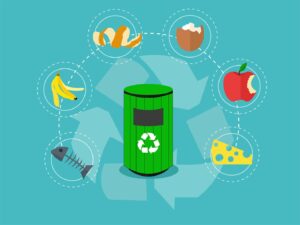 Companies all over the country are already composting in their offices. In San Francisco, for example, the Mandatory Recycling and Composting Ordinance requires every business in the city to “properly separate recyclables and compostables and keep them out of the landfill.” If they can do it, you can too!
Companies all over the country are already composting in their offices. In San Francisco, for example, the Mandatory Recycling and Composting Ordinance requires every business in the city to “properly separate recyclables and compostables and keep them out of the landfill.” If they can do it, you can too!
Composting doesn’t have to be expensive, smelly, or time-consuming. To learn how to start composting at work, simply follow the handy guide below.
Step 1: Bring Your Coworkers on Board
 You can’t start an office composting program on your own. For it to work well, the management team and your coworkers need to be on board. Run your idea by management first. Then, consider forming a compost committee. You can work together to estimate your office’s food waste, pick out a compost system, and create compost guidelines for your coworkers. Joining forces will make the whole process easier and more fun.
You can’t start an office composting program on your own. For it to work well, the management team and your coworkers need to be on board. Run your idea by management first. Then, consider forming a compost committee. You can work together to estimate your office’s food waste, pick out a compost system, and create compost guidelines for your coworkers. Joining forces will make the whole process easier and more fun.
Step 2: Choose Your Compost System
Throwing your lunch scraps into an open-air compost pile out back isn’t the only way to start composting at work. In fact, it’s probably the most difficult option! Before you commute with a roll of chicken wire and a rake, consider these other methods.
Municipal Composting
If your city has a compost program in place, composting at work may be as simple as requesting a compost bin. This is the quickest and easiest method because the city will empty the bin for you and truck the food waste offsite. Check your city’s website for more information on the options available to you.
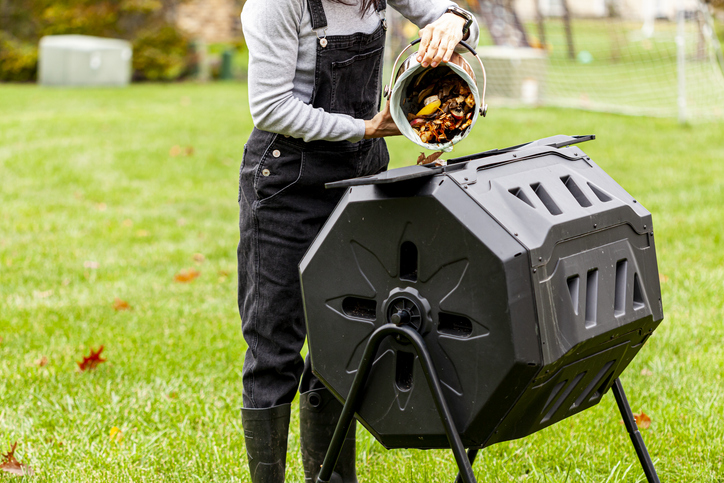
Compost Tumblers
If you work in a large office that generates a lot of food scraps and coffee grounds, a tumbler system might work well for you. These barrel-shaped composters enclose the food waste, eliminating odors. They also make composting relatively quick and easy. Simply dump your food waste into the tumbler’s drum and use the handle to turn it a few times a week. Here’s a more in-depth guide to tumblers. You can find affordable tumblers for as little as $60, or go for a higher-quality tumbler closer to $600.
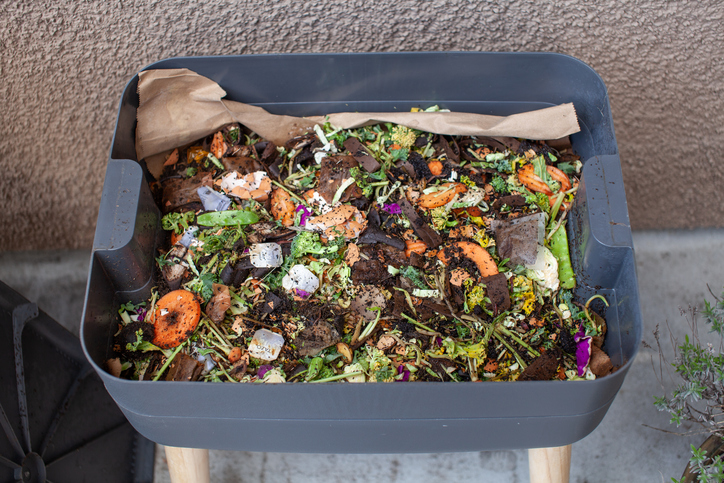
Worm Bins
Worm bins, or vermicomposters, work well for small offices. They’re very affordable (many kits cost just $70-$150, plus worms), low maintenance, and easy to set up using this guide from the United States Department of Agriculture. To keep your worms happy and healthy once your bin is up and running, check out this Worm Care Guide written by a master composter.
Electric Composters
Electric composters like the Vitamix Foodcycler or Lomi are another great option for small offices. You simply add your scraps to the machine’s compost bucket and press a button to turn them into compost when the bucket is full. Electric composters include filters to eliminate odors and some, like the Lomi, are even self-cleaning. These composters are smaller, more energy-intensive, and more expensive ($400-$600) than the other compost options we listed, but the hassle-free compost can be well worth it.
Step 3: Educate, Educate, Educate
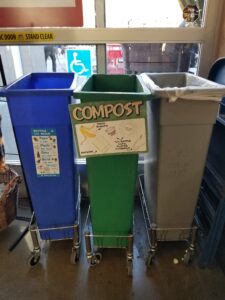
For your office composting program to succeed, you’ll need the support of your whole team.
Start by informing everyone about the new program before you implement it (a company-wide email or announcement should work perfectly). Then, remind them about the program when the equipment arrives. You can do this by sending an email about the equipment explaining how (and how not) to use it.
Once things are up and running, put up clear signage near your compost, trash, and recycle bins explaining what can go in each bin and set an example by using the composter correctly. Make sure your coworkers know that you and the other members of the compost committee are always open to questions. The more comfortable they get with the composting process, the better they’ll do at sorting their scraps correctly. To get the gardeners in your office excited about the project, you can even offer to share the finished compost with them.
How to Start Composting at Work: FAQs
Will it stink?
Composting isn’t 100% smell-free, but using an enclosed tumbler or electric composter can help eliminate most odors. You can also keep the smells under control by balancing your compost inputs. If you add a mix of “greens” (food waste) and “browns” (paper, cardboard, leaves) to your composter, your compost should smell like dirt, not trash.
How do I keep pests out?
If you use an enclosed compost system and/or keep your composter inside, you shouldn’t have to worry much about pests. To be extra careful, though, you can check out these tips for keeping animals away and this guide to avoiding fruit flies.
How much maintenance will it take?
Different compost systems take different levels of maintenance, but at the very least you’ll need to fill and empty your compost. To keep things easy, rely on your compost committee and split the work of maintaining your system.
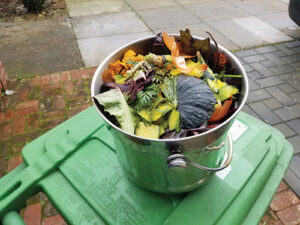
What if my coworkers add trash to the compost?
If you see trash in your compost, that might mean you need to up your education efforts. Make a larger sign, or send a follow-up email reminding your coworkers of what they can compost and what they can’t. (This differs by system, so it can be a little confusing!) While everyone is getting used to composting, consider keeping disposable gloves on hand to pull out the occasional plastic fork that might end up in your compost bin.
Are there food scraps that we can’t compost?
As we mentioned above, every compost system has different rules about what you can and can’t compost. When you pick your system, make sure you read up on which foods it processes easily and which are more difficult, like citrus.
What about compostable containers and packaging?
Municipal compost systems can typically handle compostable containers and packaging, while most smaller-scale compost systems can’t. Check the recommendations for your system to be sure.
Can I compost office printer paper?
Yes! Shredded paper and cardboard are considered “browns” and are great for balancing out food scraps in compost, with a few exceptions. Check out this article from The Sierra Club to learn more.
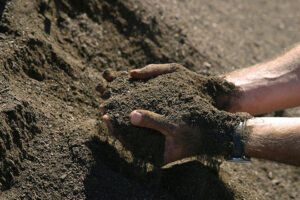
What do I do with the compost?
Once you start asking around, you’ll find that your office compost is in hot demand. Start by asking the gardeners in your office if they’d like to take it home to enrich their soil. If you’re making more compost than they can handle, you can partner with a local community garden or a farmer from your local farmers’ market to take the rest.
If you felt lost on how to start composting at work, hopefully this guide gave you a solid foundation. When you’re ready to learn more about going green at the office, check out our blog “4 Ways to Reduce Office Food Waste.”
Recent Articles
The 5 Best Fruits for Protein (and How to Enjoy Them at Work)
How to Choose the Right Organic Produce Supplier for Your Office
What Do Italians Call a Donut Peach?
Curious Where We Buy Gravenstein Apples? Meet a Farm Partner
Subscribe to our Newsletter
"*" indicates required fields



